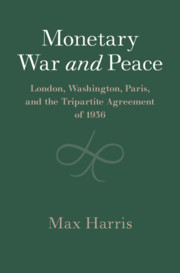Book contents
- Monetary War and Peace
- Studies in Macroeconomic History
- Monetary War and Peace
- Copyright page
- Contents
- Figures
- Tables
- Acknowledgments
- Abbreviations
- Introduction
- 1 A Classical Prelude, 1880–1914
- 2 Britain’s Biggest Blunder, 1914–1931
- 3 Hostilities Commence, 1931–1933
- 4 Washington Declares War, 1933–1935
- 5 Negotiating Peace, 1935–1936
- 6 A New Order, 1936–1939
- 7 Gold and Dollars, 1936–1937
- 8 Keeping France Afloat, 1937–1938
- 9 Battle for Sterling, 1938–1939
- 10 From Bretton Woods to Today
- Conclusion
- Book part
- References
- Index
- Series page
4 - Washington Declares War, 1933–1935
Published online by Cambridge University Press: 24 February 2021
- Monetary War and Peace
- Studies in Macroeconomic History
- Monetary War and Peace
- Copyright page
- Contents
- Figures
- Tables
- Acknowledgments
- Abbreviations
- Introduction
- 1 A Classical Prelude, 1880–1914
- 2 Britain’s Biggest Blunder, 1914–1931
- 3 Hostilities Commence, 1931–1933
- 4 Washington Declares War, 1933–1935
- 5 Negotiating Peace, 1935–1936
- 6 A New Order, 1936–1939
- 7 Gold and Dollars, 1936–1937
- 8 Keeping France Afloat, 1937–1938
- 9 Battle for Sterling, 1938–1939
- 10 From Bretton Woods to Today
- Conclusion
- Book part
- References
- Index
- Series page
Summary
This chapter describes the monetary antagonism that pervaded the world from Roosevelt's inauguration in 1933 to the development of an uneasy ceasefire by the middle of 1935. Roosevelt's departure from the gold standard fundamentally changed the monetary system, and his chaotic method of doing so exacerbated the mutual suspicion already rife in the great capitals of the world. Once Roosevelt officially devalued the dollar in January 1934, Britain and France were clueless as to what, if anything America would do next; America and France were furious as Britain refused to stabilize the pound; and the world watched France flounder as its currency increasingly came under pressure. While Britain and America reached an uneasy suspension of monetary hostilities in 1935, the precariousness of the franc meant that this superficial stability was liable to crumble at any moment.
Keywords
- Type
- Chapter
- Information
- Monetary War and PeaceLondon, Washington, Paris, and the Tripartite Agreement of 1936, pp. 76 - 100Publisher: Cambridge University PressPrint publication year: 2021

